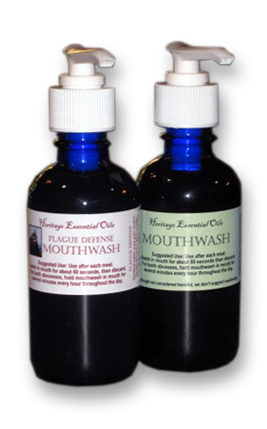~ Click here for a Mouthwash PDF file ~
- Kills Plaque
- Prevents Gingivitis
- Natural Product
- Helps maintain Healthy Teeth and Gums
- No Preservatives
- No Additives
- Taste is strong, but not unpleasant

Suggested use: Swish in mouth after each meal for about 60 seconds, then discard. For tooth abscesses, hold mouthwash in mouth for several minutes every hour throughout the day.
The main cause of cavities is the buildup of plaque, which is a thin, transparent film on the surface of the teeth. Plaque contains bacteria, and when it is not removed, it hardens into tartar, which leads to cavities in teeth and gingivitis (inflammation) of the gums. For tooth abscesses, some have reported benefit to holding the mouthwash in mouth for several minutes every hour throughout the day.
The goal of dental hygiene is to prevent the buildup of plaque. Bloodroot (also called Sanguinaria root) is a proven plaque-killing herb, and is the active ingredient in Heritage Mouthwash. The results of one study showed that Sanguinaria extract in oral rinse significantly decreased gingivitis. The United States' FDA has approved the inclusion of sanguinarine in toothpastes as an antibacterial or anti-plaque agent. We add myrrh because of it’s healing qualities for mouth sores.
1. Godowski KC (1989). "Antimicrobial action of sanguinarine". J Clin Dent 1 (4): 96–101. PMID 2700895.
2. Southard GL, Boulware RT, Walborn DR, Groznik WJ, Thorne EE, Yankell SL (March 1984). "Sanguinarine, a new antiplaque agent: retention andplaque specificity". J Am Dent Assoc 108 (3): 338–41. PMID 6585404.
3. How to Report Problems With Products Regulated by FDA
Kuftinec MM, Mueller-Joseph LJ, Kopczyk RA (1990). "Sanguinaria toothpaste and oral rinse regimen clinical efficacy in short- and long-term trials". J Can Dent Assoc 56 (7 Suppl): 31–3. PMID 2207852.
www.sciencedirect.com/science?_ob=ArticleURL&_udi=B6T8D-41Y86SD-5&_user=10&_rdoc=1&_fmt=&_orig=search&_sort=d&_docanchor=&view=c&_acct=C000050221&_version=1&_urlVersion=0&_userid=10&md5=d0598d4874437fb9506b5945fa05230f
Wikipedia definition of Bloodroot (Sanguinaria root)
Mouthwash Research
American Dental Association
AmDent Assoc. 2003 Mar;134(3):359-65. Erratum in: J Am Dent Assoc. 2003 May;134(5):558.?Comment in: J Am Dent Assoc. 2003 Jun;134(6):680; discussion 680.
The efficacy of an essential oil antiseptic mouth rinse vs. dental floss in controlling interproximal gingivitis: a comparative study.
Bauroth K, Charles CH, Mankodi SM, Simmons K, Zhao Q, Kumar LD.?Dental Products Testing, West Palm Beach, Fla, USA.
BACKGROUND: The use of dental floss has long been considered to be effective in controlling interproximal plaque and gingivitis. The authors compared this method with that of use of a mouth rinse.
METHODS: Subjects with mild-to-moderate gingivitis enrolled in a long-term, six-month study. They received a dental prophylaxis and were randomized into one of the three following treatment groups: brushing and rinsing with an essential oil-containing mouth rinse (the BEO group), brushing and flossing (the BF group) and brushing and rinsing with a control rinse (the B group).
RESULTS: A total of 326 subjects were evaluated. The BEO and BF had significantly lower (P < .001) mean interproximal Modified Gingival Index, or MGI, scores than did ?the B group at six months. The BEO group had lower mean interproximal Plaque Index, or PI, scores than the other two groups at both three and six months. The BF group's mean PI score was significantly lower than the B group's mean score at six months only. The magnitude of reductions for the BEO and the BF groups (vs. the B group) in MGI were 11.1 percent and 4.3 percent and for PI were 20.0 percent and 3.4 percent, respectively.
CONCLUSIONS: In conjunction with professional care (prophylaxis) and tooth brushing over six months, rinsing twice daily with an essential oil-containing mouth rinse was at least as good as flossing daily in reducing interproximal plaque and?gingivitis.
Clinical Implications. When weighing recommendations for oral hygiene home care, clinicians should consider that an essential oil-containing mouth rinse may be a useful adjunct in patients with gingival inflammation.
Publication Types: ?Clinical Trial ?Randomized Controlled Trial ?PMID: 12699051 [PubMed - indexed for MEDLINE]
Information and statements regarding Heritage Essential Oils’ products have not been evaluated by the FDA and are not intended to diagnose, treat, cure, or prevent any health condition or disease.
We do not make any therapeutic claims for any Dietary Supplements in accordance with the Dietary Supplement Health and Education Act and FDA regulations.
Heritage Essential Oils and any of its directors, employees, representatives or those involved in blending and bottling the oils will not be liable for damages arising out of or in connection with the use of their products. This is a comprehensive limitation of liability that applies to all damages of any kind, including (without limitation) compensatory, direct, indirect or consequential damages, income or profit and claims of third parties.
We disclaim any liability if the user uses or prescribes any remedy or essential oil, natural or otherwise, for him/herself or another. Please consult a licensed healthcare professional should a need be indicated.